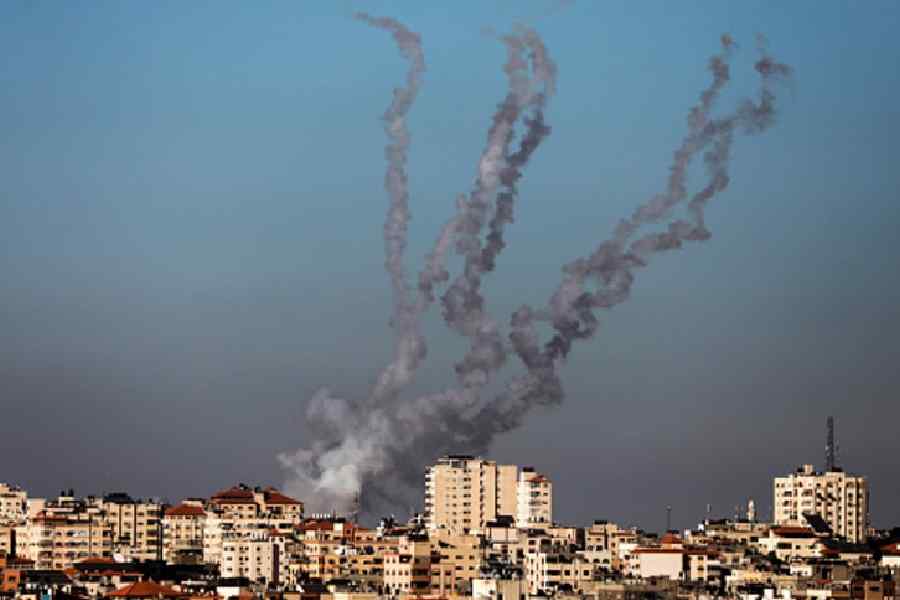UN chief Antonio Guterres on Tuesday asserted that no party to an armed conflict is above international humanitarian law as he expressed deep alarm over the “relentless bombardment” of the Hamas-ruled Gaza Strip by Israeli forces and appealed to all to “pull back from the brink” before the violence escalates even further.
"The situation in the Middle East is growing more dire by the hour. The war in Gaza is raging and risks spiralling throughout the region. Divisions are splintering societies. Tensions threaten to boil over,” Guterres told a Security Council ministerial meeting on the Middle East.
"On this UN Day, at this critical hour, I appeal to all to pull back from the brink before the violence claims even more lives and spreads even farther,” he said.
The meeting, held under the Brazilian President of the Council, was attended by US Secretary of State Antony Blinken, Israel’s Minister for Foreign Affairs Eli Cohen, Palestine’s Minister of Foreign Affairs and Expatriates Riyad Al-Maliki, Brazil’s Minister for Foreign Affairs Mauro Vieira and France’s Minister for Europe and Foreign Affairs Catherine Colonna among others.
Guterres said he is deeply concerned about the “clear violations of international humanitarian law that we are witnessing in Gaza.
"Let me be clear: No party to an armed conflict is above international humanitarian law." Reiterating his appeal for an immediate humanitarian ceasefire, Guterres said even war has rules and stressed that the international community must demand that all parties uphold and respect their obligations under international humanitarian law.
He also highlighted the need to take constant care in the conduct of military operations to spare civilians; and respect and protect hospitals and respect the inviolability of UN facilities which today are sheltering more than 600,000 Palestinians.
"The relentless bombardment of Gaza by Israeli forces, the level of civilian casualties, and the wholesale destruction of neighbourhoods continue to mount and are deeply alarming,” Guterres said.
The UN chief underscored that the protection of civilians is paramount in any armed conflict.
“Protecting civilians can never mean using them as human shields. Protecting civilians does not mean ordering more than one million people to evacuate to the south, where there is no shelter, no food, no water, no medicine and no fuel, and then continuing to bomb the south itself,” he said.
Guterres’s remarks were a reference to Israel’s ultimatum this month that Palestinians in Gaza relocate to the strip’s south following the October 7 attack on Israel by Hamas militants.
Guterres, while condemning unequivocally the “horrifying and unprecedented” acts of terror by Hamas in Israel on October 7, said that it is important to also recognise the attacks by Hamas “did not happen in a vacuum”.
“The Palestinian people have been subjected to 56 years of suffocating occupation. They have seen their land steadily devoured by settlements and plagued by violence; their economy stifled; their people displaced and their homes demolished. Their hopes for a political solution to their plight have been vanishing,” he said.
Guterres, however, stressed that the grievances of the Palestinian people cannot justify the appalling attacks by Hamas. “And those appalling attacks cannot justify the collective punishment of the Palestinian people.” The UN chief said an immediate humanitarian ceasefire would ease the “epic suffering” and make delivery of aid in Gaza easier and safer.
He termed the humanitarian relief that is finally getting into Gaza as “a drop of aid in an ocean of need.” He voiced concern that UN fuel supplies in Gaza will run out in a matter of days, bringing another disaster. “Without fuel, aid cannot be delivered, hospitals will not have power, and drinking water cannot be purified or even pumped. The people of Gaza need continuous aid delivery at a level that corresponds to their enormous needs. That aid must be delivered without restrictions.” Guterres underlined that even in this moment of grave and immediate danger, “we cannot lose sight" of the only realistic foundation for true peace and stability in the Middle East - a two-state solution.
“Israelis must see their legitimate needs for security materialised, and Palestinians must see their legitimate aspirations for an independent State realised, in line with United Nations resolutions, international law and previous agreements,” he said.
Special Coordinator for the Middle East Peace Process Tor Wennesland told the Council that the Ministry of Health (MoH) in Gaza has reported over 5,000 Palestinians have been killed so far, including over 2,000 children and 1,100 women as well as journalists, medical workers and first responders, with more than 15,000 injured.
Authorities estimate that hundreds more lay dead or injured under the rubble as rescue efforts languish amid continuous airstrikes. Over 1 million Palestinians have been displaced.
He said that evidence emerging from the October 7 attack by “Hamas and other Palestinian armed groups” on Israel revealed a sickening killing spree, designed to terrorise, with appalling scenes of brutality, massacres and hostage-taking, including against infants and young children.
In all, Hamas and other Palestinian militant groups killed over 1,400 Israelis and foreign nationals – the bloodiest attack in Israel’s history, he said. This includes over 1,000 civilians, many of them women and children, and over 360 security forces personnel. Over 5,400 Israelis were injured.
At least 220 civilians, including women and children, as well as soldiers, were abducted and taken into the Strip as hostages. While not confirmed, Hamas has said that 22 hostages were killed by Israeli strikes,” Wennesland said.
Echoing the Secretary-General’s appeal for a humanitarian ceasefire, Wennesland said the risk of a significant further deterioration of the situation in the occupied West Bank or spillover of the conflict in the region remains significant.
Except for the headline, this story has not been edited by The Telegraph Online staff and has been published from a syndicated feed.











